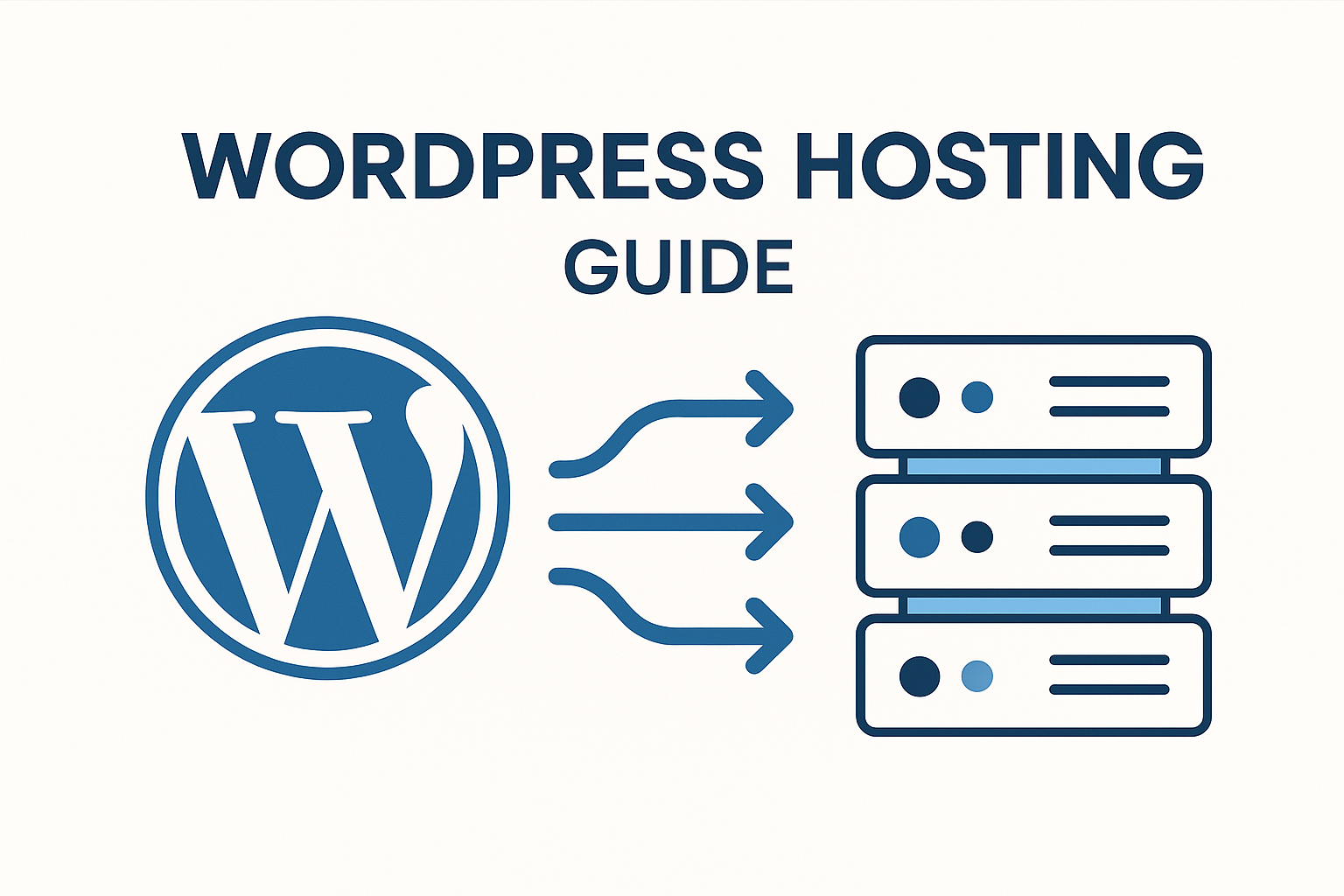
Starting your first WordPress website can feel overwhelming, especially when you’re trying to figure out which hosting service is right for you. With WordPress powering over 43% of all websites globally, choosing the right WordPress hosting provider is one of the most important decisions you’ll make for your online presence.
WordPress hosting isn’t just another tech buzzword. It’s the foundation that determines how fast your site loads, how secure it stays, and how smoothly it runs for your visitors. The good news? You don’t need to be a tech expert to make the right choice.
This WordPress hosting guide will walk you through everything you need to know as a beginner. We’ll cover the different types of hosting, what features matter most, and which hosting providers offer the best value for beginners. By the end, you’ll have the confidence to choose a hosting plan that fits your needs and budget, whether you’re starting a personal blog, business website, or online store.
Understanding WordPress Hosting Types
Shared Hosting: The Beginner’s Starting Point
Shared hosting is exactly what it sounds like. Your WordPress website shares server resources with dozens or even hundreds of other websites. Think of it like renting an apartment in a building where you share utilities with other tenants.
For WordPress beginners, shared hosting offers several advantages:
- Affordable pricing starting as low as $2-5 per month
- One-click WordPress installation that gets you started quickly
- User-friendly control panels like cPanel that simplify website management
- 24/7 customer support to help when you get stuck
Most shared hosting plans can handle 1,000 to 2,000 daily visitors comfortably. Popular providers like Bluehost, Hostinger, and SiteGround offer optimized shared hosting specifically designed for WordPress websites.
The main drawbacks include slower loading speeds during traffic spikes and limited customization options. However, for most beginners, these limitations won’t be noticeable until your site grows significantly.
Managed WordPress Hosting: Premium Performance
Managed WordPress hosting is like having a personal assistant for your website. The hosting provider handles all the technical maintenance while you focus on creating content and growing your business.
Key benefits of managed hosting include:
- Automatic WordPress updates and security patches
- Enhanced website performance with specialized caching
- WordPress-specific security measures and malware scanning
- Expert WordPress support from knowledgeable staff
- Daily backups and easy restoration options
- Staging environments for testing changes safely
Companies like WP Engine, Kinsta, and Pressidium specialize in managed WordPress hosting. While prices start around $20-30 per month, the enhanced performance and peace of mind often justify the cost for serious website owners.
VPS Hosting: More Power and Control
Virtual Private Server (VPS) hosting gives you dedicated server resources without the full cost of a dedicated server. It’s like upgrading from an apartment to a townhouse where you have more space and control.
VPS hosting works well when you need:
- Root access to install custom software
- Guaranteed server resources that don’t fluctuate
- Better performance for high-traffic websites
- Scalability to handle traffic growth
However, VPS hosting requires more technical knowledge to manage effectively. Most beginners should start with shared or managed hosting and consider VPS when their websites outgrow those options.
Dedicated Hosting: Maximum Resources
Dedicated hosting gives you an entire server for your website alone. While it offers the best performance and security, it’s typically overkill for beginners and costs $100+ per month.
Essential WordPress Hosting Features for Beginners
Performance and Speed Features
Website speed directly impacts user experience and search engine rankings. Look for hosting providers that offer:
- SSD storage instead of traditional hard drives for faster data access
- Content Delivery Network (CDN) to serve your content from multiple global locations
- Built-in caching to reduce server load and speed up page loading
- HTTP/3 support for improved connection speeds
- PHP 8+ compatibility for optimal WordPress performance
Security Features
WordPress security should be a top priority when choosing a hosting provider. Essential security features include:
- Free SSL certificates to encrypt data between your site and visitors
- Automatic malware scanning and removal
- Regular security updates for WordPress core and plugins
- DDoS protection to defend against attacks
- Firewall protection specifically configured for WordPress
User-Friendly Features
As a beginner, you’ll appreciate hosting providers that prioritize ease of use:
- One-click WordPress installation to get started quickly
- WordPress staging sites for testing changes safely
- Automatic WordPress updates to keep your site secure
- Website migration assistance when switching hosts
- Beginner-friendly control panels with intuitive interfaces
Support and Reliability
Quality customer support can make or break your hosting experience:
- 24/7 live chat support for immediate assistance
- WordPress-specific expertise from support staff
- Comprehensive knowledge base with tutorials and guides
- 99.9% uptime guarantee to keep your site online
- Response times under 30 seconds for critical issues
Top WordPress Hosting Providers for Beginners in 2025
Bluehost: WordPress.org Recommended
Bluehost has been officially recommended by WordPress.org since 2005, making it a trusted choice for beginners. Their WordPress hosting plans start at $2.95 per month and include:
- Free domain name for the first year
- Free SSL certificate for security
- One-click WordPress installation
- WordPress-optimized servers with caching
- 24/7 WordPress expert support
Bluehost’s custom control panel simplifies website management, while their AI-powered site builder helps create professional-looking websites quickly. They also offer free website migration and over 1,000 WordPress tutorials.
Hostinger: Best Value for Money
Hostinger offers some of the most affordable WordPress hosting without sacrificing quality. Their plans start at $1.99 per month for long-term commitments and include:
- 99.9% uptime guarantee with excellent reliability
- LiteSpeed technology for faster loading times
- Free CDN and caching for improved performance
- WordPress acceleration with optimized servers
- AI-powered tools for easy website creation
Hostinger’s managed WordPress hosting includes automatic updates, enhanced security, and beginner-friendly features that make it easy to launch your first website.
SiteGround: Premium Features at Affordable Prices
SiteGround consistently ranks among the top WordPress hosting providers for its excellent performance and customer service. Their WordPress hosting plans include:
- Google Cloud infrastructure for blazing-fast speeds
- WordPress-specific caching for improved performance
- Free CDN and SSL certificates
- Automatic WordPress updates and security patches
- Staging environments for testing changes
SiteGround’s customer support is particularly noteworthy, with knowledgeable staff available 24/7 to help with WordPress-specific issues.
HostGator: Budget-Friendly with Simple Setup
HostGator offers affordable WordPress hosting with user-friendly features perfect for beginners:
- Simple one-click WordPress installation
- Unmetered bandwidth for growing websites
- Free SSL certificates and domain privacy
- 45-day money-back guarantee for risk-free testing
- Drag-and-drop website builder for easy customization
Their WordPress hosting plans include automatic updates and backups, making it easy to maintain your website without technical expertise.
How to Choose the Right WordPress Hosting Plan
Assess Your Website Needs
Before selecting a hosting provider, consider what type of website you’re building:
Personal blog or hobby site:
- Shared hosting is usually sufficient
- Look for plans with unlimited storage and bandwidth
- Prioritize ease of use over advanced features
Business website:
- Consider managed WordPress hosting for better performance
- Ensure the plan includes business email functionality
- Look for ecommerce features if you plan to sell products
High-traffic or resource-intensive site:
- VPS hosting may be necessary for performance
- Prioritize scalability and upgrade options
- Consider dedicated resources and advanced caching
Budget Considerations
WordPress hosting costs vary significantly based on features and performance:
Shared hosting: $2-10 per month
- Perfect for beginners and small websites
- Includes basic features and support
- Renewal rates often higher than introductory prices
Managed WordPress hosting: $20-50 per month
- Enhanced performance and security
- WordPress-specific optimization
- Premium support and advanced features
VPS hosting: $20-100 per month
- Dedicated resources and better performance
- Requires more technical knowledge
- Suitable for growing businesses
Remember that hosting prices often increase significantly after the initial term. Always check renewal rates before committing to a long-term plan.
Growth and Scalability
Choose a hosting provider that can grow with your website:
- Easy upgrade paths between hosting types
- Resource monitoring to track usage
- Performance optimization tools
- Migration assistance when changing plans
- Multiple data center locations for global reach
Getting Started with Your WordPress Hosting
Domain Name Selection
Your domain name is your website’s address on the internet. When choosing a domain:
- Keep it short and memorable
- Use your business name or relevant keywords
- Choose a reputable domain registrar
- Consider purchasing multiple extensions (.com, .net, .org)
Many hosting providers include a free domain for the first year, simplifying the setup process.
WordPress Installation Process
Most modern WordPress hosting providers offer one-click installation:
- Sign up for your hosting account
- Choose your domain name during registration
- Select “Install WordPress” from your control panel
- Complete the basic WordPress setup
- Choose a theme and begin customizing
The entire process typically takes less than 15 minutes, even for complete beginners.
Essential WordPress Configuration
After installing WordPress, complete these important setup steps:
Security Setup:
- Install a security plugin like Wordfence or Jetpack Security
- Enable two-factor authentication for admin accounts
- Use strong, unique passwords
- Limit login attempts to prevent brute force attacks
Performance Optimization:
- Install a caching plugin (if not included by your host)
- Optimize images for faster loading
- Choose a lightweight WordPress theme
- Minimize plugins to essential functionality only
SEO Foundation:
- Install an SEO plugin like Yoast or RankMath
- Submit your sitemap to Google Search Console
- Set up Google Analytics for traffic tracking
- Optimize permalinks for search engines
Common WordPress Hosting Mistakes to Avoid
Choosing Based on Price Alone
While budget is important, the cheapest hosting option isn’t always the best value. Consider:
- Renewal pricing after introductory periods
- Performance limitations that could hurt user experience
- Support quality when you need help
- Security features to protect your investment
- Upgrade costs as your site grows
Ignoring Backup Solutions
Website backups are your safety net against data loss:
- Choose hosts that include automatic daily backups
- Understand the backup retention policy
- Test backup restoration processes
- Consider additional backup plugins for extra protection
- Store backups in multiple locations
Overlooking Support Quality
Good customer support becomes crucial when problems arise:
- Test support responsiveness before committing
- Verify WordPress-specific expertise
- Check support availability (24/7 vs business hours)
- Read customer reviews about support experiences
- Understand escalation procedures for complex issues
Not Planning for Growth
Your hosting needs will change as your website grows:
- Choose providers with clear upgrade paths
- Understand traffic limitations and overage charges
- Plan for increased storage and bandwidth needs
- Consider future ecommerce or membership functionality
- Research migration options if you outgrow your host
Also Read: How to Set Up a WordPress Website in Under an Hour
WordPress Hosting Security Best Practices
Host-Level Security Features
A secure hosting environment forms the foundation of website security:
- Server-level firewalls to block malicious traffic
- Regular security updates for server software
- Malware scanning and automatic removal
- DDoS protection against large-scale attacks
- Secure data centers with physical security measures
WordPress-Specific Security Measures
Beyond hosting security, implement WordPress-specific protections:
- Keep WordPress updated to the latest version
- Use reputable plugins from verified developers
- Regular security audits to identify vulnerabilities
- Limit user access to necessary permissions only
- Monitor login activity for suspicious behavior
SSL Certificates and HTTPS
SSL certificates encrypt data between your website and visitors:
- Most hosts now include free SSL certificates
- Ensure automatic renewal to prevent expiration
- Verify proper HTTPS configuration
- Update internal links to use HTTPS
- Consider Extended Validation (EV) certificates for business sites
WordPress Performance Optimization
Server-Level Performance
Your hosting provider plays a crucial role in website performance:
- SSD storage for faster data access
- PHP 8+ support for improved processing speeds
- Built-in caching mechanisms
- CDN integration for global content delivery
- Resource allocation appropriate for your needs
WordPress Optimization Techniques
Optimize your WordPress installation for better performance:
- Choose lightweight themes optimized for speed
- Optimize images before uploading
- Minimize plugin usage to essential functionality
- Use caching plugins if not included by your host
- Clean up databases regularly to remove bloat
Monitoring and Maintenance
Regular maintenance keeps your WordPress website running smoothly:
- Monitor uptime and page load speeds
- Update plugins and themes regularly
- Optimize databases to improve performance
- Review analytics to identify performance issues
- Schedule regular maintenance tasks
Cost Analysis and Budget Planning
Initial Setup Costs
Budget for these essential WordPress hosting expenses:
Hosting plan: $2-50 per month depending on type Domain name: $10-15 per year (often free first year) SSL certificate: Usually included with hosting Premium theme: $50-100 (optional, free themes available) Essential plugins: $0-200 per year for premium versions
Ongoing Monthly Expenses
Plan for recurring costs as your website grows:
- Hosting renewal (often higher than introductory rates)
- Domain renewal annually
- Plugin subscriptions for premium functionality
- Backup services if not included
- Security services for enhanced protection
Scaling Costs
As your website grows, expect increased expenses:
- Hosting upgrades to handle more traffic
- CDN services for global performance
- Professional maintenance services
- Advanced security solutions
- Performance optimization tools
Conclusion
Choosing the right WordPress hosting provider sets the foundation for your website’s success. While the options may seem overwhelming at first, focusing on your specific needs as a beginner will help narrow down the choices. Shared hosting from reputable providers like Bluehost, Hostinger, or SiteGround offers an excellent starting point with room to grow. Remember that the cheapest option isn’t always the best value – prioritize reliability, support quality, and WordPress-specific features over rock-bottom pricing. Most importantly, don’t let analysis paralysis prevent you from getting started. Every successful WordPress website began with someone taking that first step, and with the right hosting foundation, yours can too.







